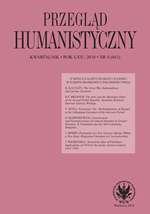Constructions and Deconstructions of Cultural Identities in Greater Romania. B. Fundoianu and the Self-Colonizing Metaphor
Constructions and Deconstructions of Cultural Identities in Greater Romania. B. Fundoianu and the Self-Colonizing Metaphor
Author(s): Olga BartosiewiczSubject(s): History, Anthropology, Social Sciences, Culture and social structure
Published by: Wydawnictwa Uniwersytetu Warszawskiego
Keywords: Self-Colonizing Metaphor; Ideologies in Greater Romania; B. Fundoianu; Orthodoxism; Sămănătorism; Synchronism; Cultural Identity in Greater Romania; Westernization; Romanian Modernity
Summary/Abstract: The article “Constructions and Deconstructions of Cultural Identities in GreaterRomania. B. Fundoianu and the Self-Colonizing Metaphor” proposes a general overview oftwo dominant narratives in cultural identity discourse in Greater Romania: the traditionalistand the modernist one. Even though the proponents of each of the tendencies have a differentvision of constitutive elements which Romanian identity consists of their aspirations aresimilar: they want to define Romania’s place in the changed political system in Europeafter World War I. Furthermore, they attempt to answer the following question: what path ofevolution should the new-born country follow?However, the article also presents a critical approach to the ideas and myths circulatingin intellectual milieus after 1918. Hence, the second part of the study analyzes two essays:“Preface” to Images and Books from France and “Critical Spirit in Romanian Culture,”published by a Romanian Jewish author B. Fundoianu (1898–1944). Through his texts, theyoung essayist builds a counter-narrative which exposes the danger of blind search fornational specificity and encourages Romanian intellectuals to use the “critical spirit” as themain tool in the processes of modernization. Denominating Romania “a French culturalcolony,” Fundoianu draws attention to the dilemmas discussed in the article through theprism of the category of “self-colonization,” introduced to the discourse about Central andSouth-Eastern Europe by the contemporary Bulgarian historian Alexander Kiossev.
Journal: Przegląd Humanistyczny
- Issue Year: 463/2018
- Issue No: 4
- Page Range: 49-61
- Page Count: 13
- Language: English
- Content File-PDF

